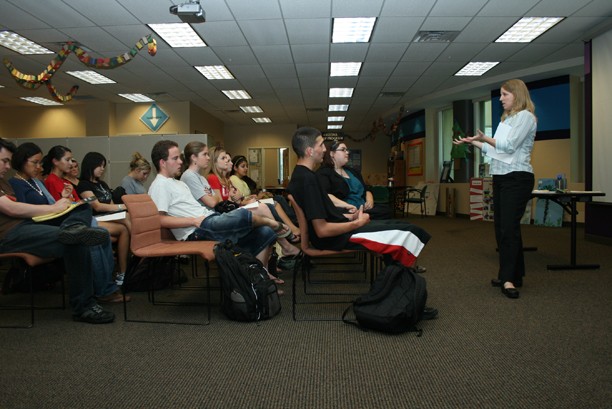With Valentine’s Day fast approaching, Campus Health Service is prepared with its annual SexTalk week.
SexTalk week will consist of 10 main events, starting on Feb. 11 and ending on Feb. 15. The 10 different events all pertain to the main goal of SexTalk week, according to health educator and coordinator Carrie Hardesty. SexTalk week will start on Monday with “Sex at the Rec” from 3 p.m. to 6 p.m. at the Student Recreation Center, where students can pick up free gift bags.
“We hope students will gain information and knowledge about safer sex, risk reduction, birth control options, condoms and the importance of getting tested and getting consent from their partner(s),” Hardesty said in an email.
SexTalk week has been held on campus for the past 25 years, according to Lee Ann Hamilton, assistant director of Health Promotion and Preventive Services at Campus Health. In 1987, the weeklong event was known as National Condom Week. However, the name was changed because the event’s goal was to teach about sexual health in general, not just condoms, Hamilton said.
Seventy-four percent of UA students reported that they’d had either one or no sexual partners during the past school year and 55 percent of first year students have not had sexual intercourse in the past year, said Hamilton in a press release. Despite these percentages, Hamilton stressed the importance of educating students about sexual health.
“Not every student is having sexual intercourse but everyone is a sexual being,” Hamilton said. “They may not be in a relationship now, but they may be doing sexual activities that can lead up to sexual intercourse. For those choosing to not have sex, there is definitely information available to them about healthy relationships. The real part of it is, you can have better relationships and better sexual relationships the more you know about your body and the facts around sexual health.”
The Sexual Health Resource Fair will be held Wednesday from 10 a.m. to 2 p.m. on the UA Mall. Students will be able to learn about sexual health, relationships, birth control, pregnancy options, sexual assault, abstinence and STDs from more than 15 campus and community groups, Hardesty said. Participants in the event include Catholic Social Services, the Office of LGBTQ Affairs, the Pima County Health Department, Planned Parenthood and Pima Prevention Partnership.
“SexTalk week really encourages students to make healthy choices and gives them responsibility if they choose to have it,” Hardesty said. “We hope that they take away some knowledge, whether it’s about healthy relationships, how to be safer in the sexual encounters they are in and how to choose risk reduction methods.”









